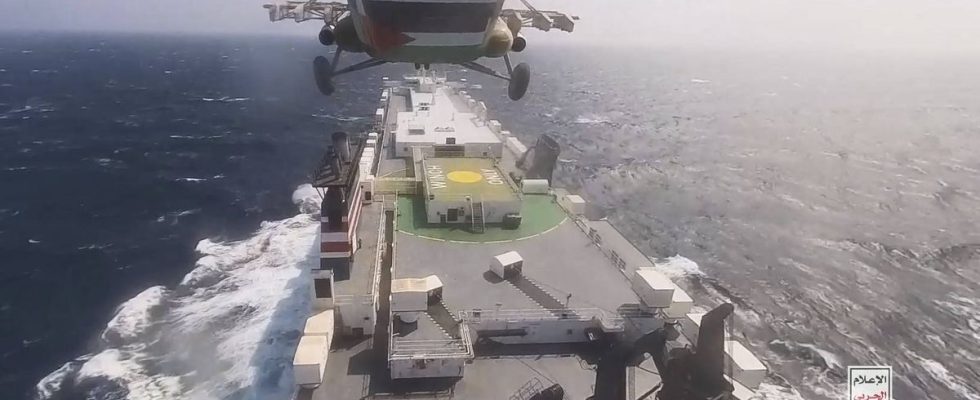The cavalry arrives. The American Minister of Defense announced on Monday the formation in the Red Sea of a coalition of 10 countries, in order to face repeated attacks by the Houthis against ships that these Yemeni rebels consider to be “linked to Israel”.
In addition to the United States, Lloyd Austin indicated in a press release that France, the United Kingdom, Bahrain, Canada, Italy, the Netherlands, Norway, Spain, and the Seychelles would take part in this coalition.
“The recent escalation of reckless Houthi attacks from Yemen threatens the free flow of trade, endangers the lives of innocent sailors and violates international law,” he said. “That is why today I am announcing the establishment of Operation Prosperity Guardian,” added the Pentagon chief.
Visiting Israel, Lloyd Austin earlier called on Iran to stop its “support” for Houthi operations against commercial shipping, following talks with Israeli Prime Minister Benjamin Netanyahu. Israel is not one of the states mentioned by the Pentagon chief as being part of the Red Sea coalition.
In 2019, Washington launched a naval coalition to protect maritime transport in Gulf waters, after a series of attacks attributed by the United States to Iran, which denied being at the origin.
Transit suspended
Earlier on Monday, the Houthis claimed responsibility for new attacks in the Red Sea targeting two vessels “linked to Israel”. The Houthis claimed in a statement to have “carried out a military operation against two ships linked to the Zionist entity using seaplanes”, identifying the targeted ships as the M/T Swan Atlantic and the MSC Clara.
The owner of the Norwegian ship M/T Swan Atlantic has admitted that the tanker was hit by an “unidentified object”. “Fortunately the Indian crew members were not injured and, according to them, the boat suffered limited damage,” Norwegian shipowner Inventor Chemical Tankers said in a statement.
In the immediate future, maritime transport giants are deserting passage through the strategic Bab al-Mandeb Strait, which separates the Arabian Peninsula from Africa, and through which 40% of world trade passes.
Following the example of many shipowners, the British hydrocarbon giant BP and the Taiwanese maritime transport giant Evergreen have announced that they are suspending all transit in the Red Sea because of the repeated attacks.
At the end of last week, the Danish Maersk, the German Hapag-Lloyd, the French CMA CGM and the Italian-Swiss MSC had announced in recent days that their ships would no longer use the Red Sea “until further notice », at least until Monday or until the passage “is safe”. The head of French diplomacy Catherine Colonna estimated on Sunday that these attacks “cannot go unanswered”.
“No connection with Israel”
Controlling much of Yemen, the Houthis have warned they will target ships sailing off the country’s coast if they have links to Israel, in response to the war between Israel and the Palestinian Islamist movement Hamas in the Strip. Gaza. Several missiles and drones were shot down by warships patrolling the area.
The Red Sea is a “sea highway” connecting the Mediterranean to the Indian Ocean, and therefore Europe to Asia. Around 20,000 ships pass through the Suez Canal each year, the entry and exit point for ships passing through the Red Sea.
“The boat has no link with Israel whether on the side of its owner (Norwegian) or the technical management (Singaporean) or its loading,” underlined the owner of the Norwegian ship of the M/T Swan Atlantic, specifying that the tanker was traveling from mainland France to Réunion. It is now under the protection of the American navy.
If they no longer transit through the Suez Canal and the Red Sea, ships will have to go around Africa and pass through the Cape of Good Hope, which will considerably lengthen journeys.
To connect Rotterdam to Singapore, the detour lengthens the journey by 40%, from approximately 8,400 nautical miles (15,550 km) to 11,720 miles (21,700 km), according to S&P Global. Several ships, notably from Maersk and MSC, have already taken this route in recent days, he explains.

